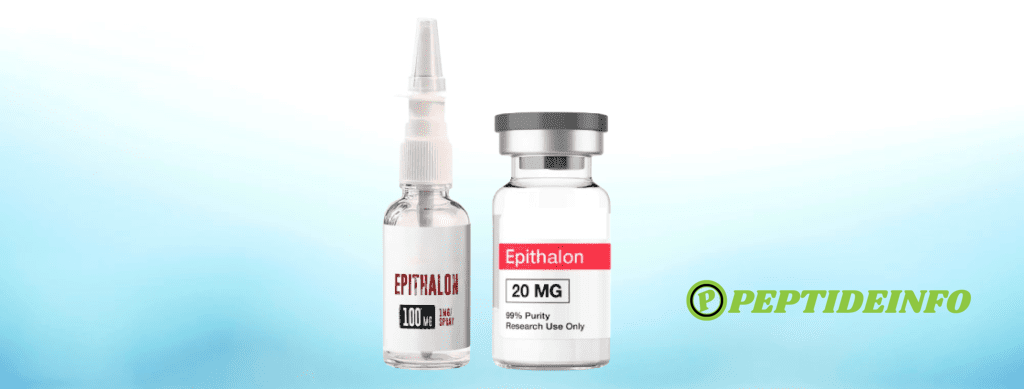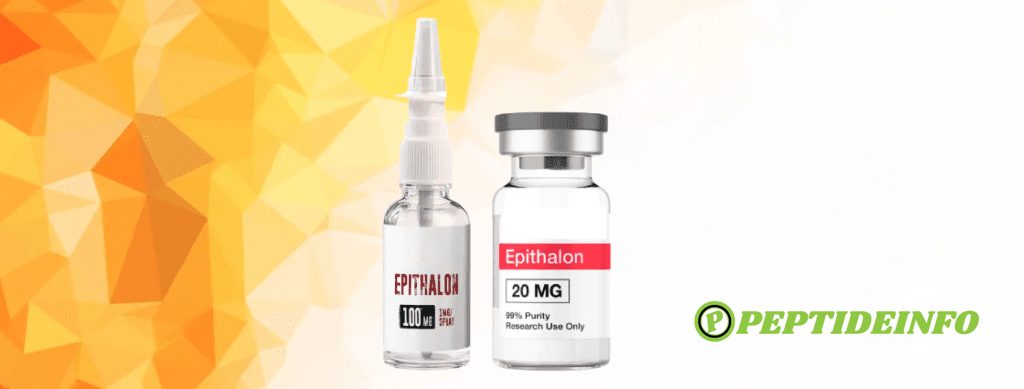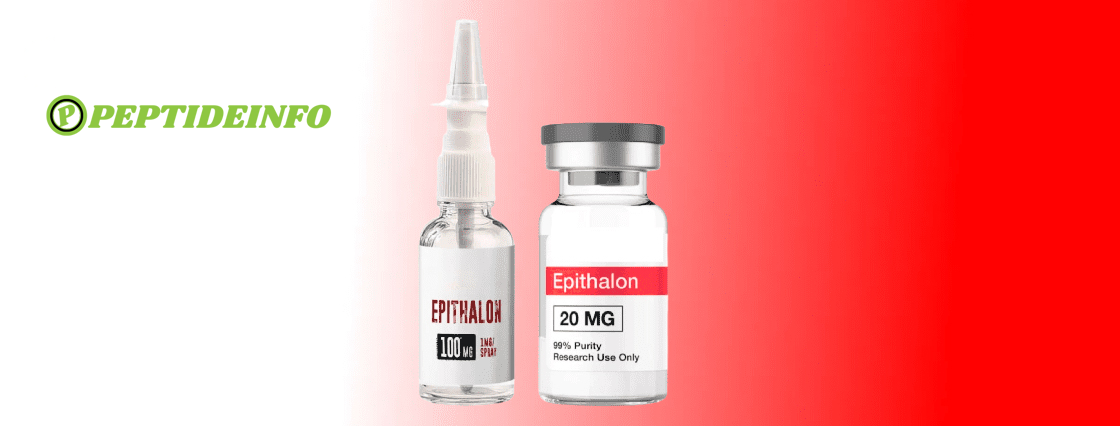What is Epithalon?
Epithalon (also, epitalon) is a tetrapeptide composed of the amino acids alanine, glutamic acid, aspartic acid, and glycine. It is isolated from a peptide complex called epithalamin, itself derived from bovine pineal glands, and primarily acts within the neuroendocrine system [1, 2].
Research on epithalamin and epithalon dates back to the 1980s, overseen mostly by Vladimir Khavinson, an accomplished scientist who is well-known for his pioneering work on other peptide bioregulators including Vilon. Numerous studies indicate epithalon’s potential anti-aging effects when administered intranasally or via injection [2, 3].
Among epithalon’s most relevant mechanisms of action is its ability to induce telomerase activity and elongate telomeres, which are the protective parts of human DNA. Telomerase allows the body to grow new cells and rejuvenate old ones, hence underlying the belief that epithalon could play a role in prolonging the lifespan of an organism [4].
While clinical trials have yet to be conducted on epithalon, epithalamin has been approved in Russia as a treatment of menopause-related symptoms, anovulatory infertility, and hormone-dependent tumors [2]. Where sold as a research chemical, epithalon may be legally handled by qualified researchers and laboratory professionals for scientific investigation.

Epithalon Benefits
Extensive research into potential epithalon benefits suggests that it is key to anti-aging processes, having notably been shown to decrease the mortality rate of elderly patients. However, it is worth noting that most research on epithalon peptide has been done by Professor Khavinson and his group, and has yet to be independently confirmed [2].
Based on the research that is available, we discuss epithalon’s potential anti-aging, sleep-enhancing, and disease-fighting properties.
Epithalon for Anti-Aging
Telomeres are protective structures at the ends of chromosomes that progressively shorten with each cell division cycle. Shortening telomeres are associated with shorter lifespan and increased risk of disease. In some cells, the enzyme telomerase lengthens the telomeres [1, 4].
Given the ability of epithalon to induce telomerase activity and elongate telomeres, researchers have long been interested in epithalon as an anti-aging instrument, and there is solid research to that end:
- A seminal study by Khavinson et al. found that epithalon lengthened telomeres and stimulated telomerase following its introduction into telomerase-negative human fetal fibroblast cultures. This led researchers to conclude that epithalon may prolong the lifespan of cells and organisms [4].
- In 2007, Vinogradova et al. found that epithalon extended the lifespan of rats exposed to natural and constant illumination by reducing the incidence of spontaneous tumors [5].
- In an eight-year study on epithalamin, Khavinson et al. found that the peptide improves cardiovascular, endocrine, immune, and nervous system metrics, concluding that it may improve longevity in elderly humans [6].
- A 12-year randomized clinical study by Korkushko et al. found that epithalamin was linked to a “geroprotective effect” and increased the lifespan of elderly subjects who otherwise presented heart disease and accelerated aging of the cardiovascular system [7]. In the follow-up study, the researchers found that the epithalamin patients had a 1.6-1.8 fold reduced mortality rate compared to the control group [8].
Epithalon and Improved Sleep
Research interest in the effect of epithalon on sleep quality stems from the peptide’s ability to increase levels of melatonin, a hormone produced in the pineal gland that is critical to sleep quality. Proper regulation of this hormone can restore the sleep-wake cycle, improve the length of sleep, and ensure restorative rest and repair of the body [9].
A 2007 trial involving both monkeys and elderly humans found that epithalon is capable of normalizing the circadian rhythm while increasing nighttime levels of melatonin in those with pineal gland dysfunction. The study authors found that epithalon may improve the quality of life of the elderly via its positive effect on sleep quality [10].
Antioxidant and Antitumor Effects
Based on epithalamin research, epithalon is believed to have antioxidant activity that contributes to the regulation of cytokines and C-reactive protein, leading to research interest in its use as a treatment of a number of inflammatory ailments like arthritis and ulcerative colitis [11, 12].
Animal studies have shown that the peptide exhibits anti-tumor activity and inhibits the expression of carcinogenic receptors [13]. In a 1997 research paper, the authors observed that the peptide may be used to decrease the size of tumors in cases of ovarian, uterine, and cervical cancer while acting to restore cellular immunity [14].
Epithalon Side Effects
While epithalon has not undergone clinical trials outside of Russia, the research to date indicates that it is well-tolerated with an excellent safety profile, and suitable for long-term use [2].
Notably, Russian researchers have conducted follow-up examinations as part of a 15-year study on elderly human volunteers who had received up to six courses of epithalamin treatment, observing no adverse events attributable to the peptide. In fact, the study authors stated that the epithalamin-treated patient group exhibited “significantly lower mortality”, decelerated aging, and normalized levels of melatonin production and lipid metabolism, compared to the control group [8].
Despite its excellent record to date, researchers administering epithalon injections should note the risk of side effects like injection site inflammation, itching, swelling, or pain. Of course, using epithalon in nasal spray form would not cause such effects.
Yet regardless of how epithalon is administered, researchers are well-advised to follow all normal precautions when conducting experimentation. This includes sourcing research-grade epithalon strictly from a reliable vendor and following best practices when handling and storing the peptide.
Epithalon Dosage Guide
While epithalon is not a US Food and Drug Administration approved peptide, decades of research into its efficacy coupled with its therapeutic use in Russia have given researchers a good understanding of the appropriate dosage to administer.
In its epithalon review, the International Peptide Society covered Professor Khavinson’s work on epithalon peptide and its anti-aging effects, and has published two epithalon dosing protocols based on their findings [15]. The first is known as the “Russian Protocol”:
- Total Dosage: 100mg epithalon
- Frequency: Administer a daily epithalon dose of 10mg.
- Study Period: 10 days
- Notes: This protocol is typically administered twice per year. Each course should be followed by a pause of at least four months.
An alternative protocol calls for half the total epithalon dosage and is known as the “Ukrainian Protocol” [15]:
- Total Dosage: 50mg epithalon
- Frequency: Administer 10mg on days 1, 5, 9, 13, and 17 of the 17-day treatment course.
- Study Period: 17 days
- Notes: This protocol is typically administered twice per year. Each course should be followed by a pause of at least four months.
It is important to note that these protocols are designed for epithalon injections. As a point of reference, the International Peptide Society notes that epithalon administered intranasally would require two to three times the injectable dosage to achieve comparable bioavailability, and thus effect.
Epithalon Nasal Spray | A Comprehensive Review
As noted, eptihalon peptide may be delivered via injection or in nasal spray form. While most researchers use epithalon injections to maximize bioavailability, some may opt for a nasal spray version of this peptide as a convenient and non-invasive delivery method.
How Does Epithalon Nasal Spray Work?
There is specific interest in the use of peptides to treat central nervous system (CNS) disorders including chronic pain and neurodegeneration. However, a set of challenges impede delivering peptides to the brain, including low metabolic stability and poor penetration of the blood-brain barrier. A peptide nasal spray is capable of bypassing the blood-brain barrier and targeting the CNS [16].
Epithalon is an exceptionally short peptide that has been successfully delivered via nasal spray in animal studies. It also gives researchers an alternative for study designs in which injections may be unsuitable. While epithalon nasal spray has not been specifically examined in a clinical trial, the research supports its compatibility with an intranasal format.
Epithalon Nasal Spray Studies
In a study on male Wistar rats, researchers intranasally administered epithalon to the rodents and measured their neuronal activity using a glass microelectrode. The researchers observed significant and consistent increases in neuronal activity just minutes following intranasal administration, finding that at least the first peak of activity was linked to epithalon’s direct action on cortical cells [3].
Another study explored the effects of intranasally administered epithalon on the pineal cells of stress-induced rats and normal rats, focusing on the proto-oncogene c-Fos, which plays a key role in brain development. Interestingly, intranasal administration of epithalon peptide promoted c-Fos gene activation and subsequent increases in c-Fos only in the stress-induced rats, suggesting that epithalon contributes to pineal self-regulation under conditions of stress [17, 18].
Overall, intranasal administration of epithalon appears to be an effective way of delivering this peptide. It is a non-invasive method of treatment, painless to the subject, and easy to administer.

Where to Buy Epithalon Nasal Spray Online? | 2024 Edition
While epithalon is available online from a variety of vendors, it is important to purchase only research-grade peptides to ensure purity and safety.
At Peptideinfo.net, it is our mission to recommend science-backed, high-quality products that are available at a fair price.
We have tested various peptide nasal sprays and are able to recommend the best place to purchase epithalon nasal spray online.
Research Peptide
Research Peptide is a well-established vendor of high-quality peptide nasal sprays. Here is what we appreciate about this top vendor:
- High-Purity Nasal Sprays: Research Peptide undertakes both in-house and third-party laboratory testing of their peptides to ensure purity and suitability for research. Each product sold is backed by a certificate of analysis and seal of authenticity.
- Fair Prices: A 100mg spray bottle of epithalon nasal spray is currently just under $152, which beats other vendors offering less than half the amount of peptide at comparable pricing.
- Convenient Payments: Payments can be made through a variety of methods including cryptocurrencies, credit card, PayPal, or e-checks. Payments are fast, secure, and reliable and all customer data is secured by encryption.
- Customer Care: The customer service team at Research Peptide is available to answer any questions or concerns that researchers may have. They have friendly representatives who respond to chat inquiries, phone calls, and emails in a timely manner.
Buy research peptides from Pure Rawz today…
Epithalon Nasal Spray vs. Injectable Epithalon
Research into epithalon peptide therapy has primarily focused on two routes of administration: instranasal and injection (both subcutaneous and intramuscular). There are a few considerations for using one or the other in research.
The main reason for using subcutaneous epithalon over a nasal spray is bioavailability. Animal and human studies alike have demonstrated the high absorption and bioavailability of epithalon peptide when injected [2, 19, 20]. In fact, subcutaneous administration is the most common means of administering the vast majority of peptides.
It is important to note that injectable epithalon comes in powder form and must be reconstituted, which involves mixing the powder with a liquid like bacteriostatic water for injection. This requires procuring necessary supplies in addition to the peptide itself. In addition, epithalon delivered by injection may occasionally cause inflammatory reactions surrounding the injection site.
On the other hand, epithalon nasal spray is convenient to administer, preformulated for the researcher, non-invasive, and is easy to transport. Animal studies involving intranasal administration of epithalon have shown that it can rapidly access the brain and induce neuronal activity, potentially speeding up onset of action compared to epithalon administered via injection [3, 17]. The caveat is that researchers have used two to three times more peptide in epithalon nasal spray studies to induce a comparable effect to injection [2].
Regardless, more clinical studies must be conducted to investigate the effects of intranasal administration of epithalon.
While an epithalon nasal spray will appeal to researchers looking for a non-invasive route of administration, those looking to deliver epithalon with maximum bioavailability are encouraged to source epithalon powder from this leading supplier.
Epithalon Nasal Spray | Verdict
Epithalon peptide therapy is backed by a multitude of research studies highlighting the peptide’s role in anti-aging processes. The peptide achieves its effects by helping to preserve telomeres, which are the protective caps of chromosomes that otherwise suffer from degradation as organisms age.
While epithalon is most commonly administered via subcutaneous injection, some researchers will opt for a nasal spray, which presents a convenient and non-invasive means of delivering the peptide, and one that is suitable for long-term compliance.
To source research-grade epithalon in nasal spray form, head over to trusted peptide vendor Research Peptide.


